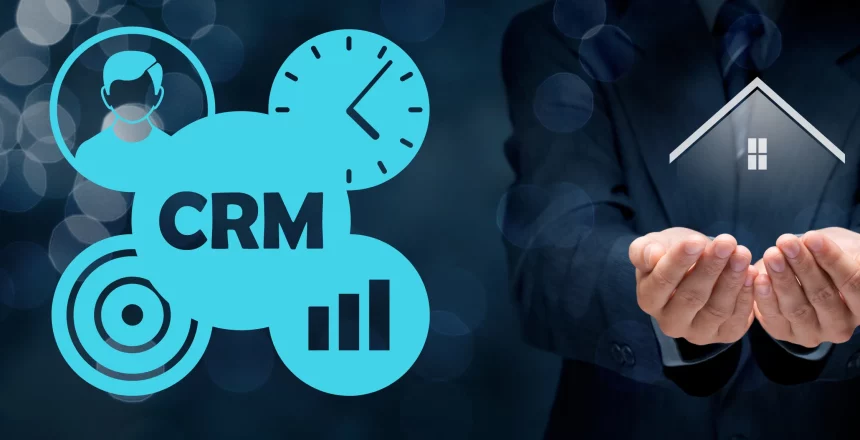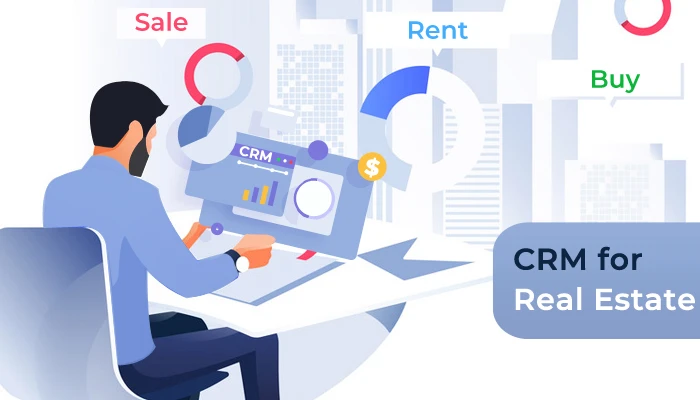A Customer Relationship Management system is a software program used by businesses to manage customer contacts and interactions.
In the world of real estate, a CRM can be an invaluable tool for keeping track of your clients, their needs and wants, as well as past and potential transactions. Understanding what is a CRM in Real Estate for your business is important.
This will help you take it beyond what was possible before and make sure that everything runs smoothly in every aspect during this time.
Source : res.cloudinary.com
The information in this article will show you how CRMs can make your business run smoother than ever before.
Table of Contents
How Does CRM help Real Estate?
CRM software is designed to allow you to manage your real estate business from one platform, whether on the go or at the workplace.
The system stores all data in the cloud, making it easy for users across any device to keep track of leads and campaigns while staying up with the latest trends that will affect them as well.
You can expect features like managing contacts, easily uploaded documents & contracts, and calendar management tools.
CRM software has been proven to help real estate agents save time, increase productivity and personalize communications.
What does the CRM Software for real estate do?
The best CRM’s for real estate supports your real estate business in the following ways:
- A great way to remember and organize all of your information, communications, and other details is by capturing them in one place
- Centralize the way you manage your leads, buyers, and sellers. You can now link all of their profiles together with links to properties, so they are easier for everyone involved in real estate transactions
- It can track marketing and interest in real estate sectors, property groups, or individual residential properties
- Streamline buying, selling and rental processes with all parties interested and third-party stakeholders
Source: hubspot.net
Using a Property Management CRM by the real estate team:
Few of the central functions in a real estate businesses:
- Realtors and real estate agents
- Administration teams
- Property and client marketing teams
- Sales and closing teams
- Customer service and support teams
1.Realtors and Real Estate Agents:
A CRM can help you be the public face of your property business. Realtors use it to:
- The smart agent will know what information to share about their clients’ property to be presented in the best possible light.
- Get a clear picture of your potential buyers by learning about their needs, budgets, and preferences.
- Remember to identify and build on previous interactions for specific properties, like the one you just visited or spoke with.
- Closing rates are calculated by matching the right properties with people who need them. This maximizes profit and customer satisfaction, which means you’ll be able to make more money.
2.Administration Teams:
The administrative team will use a CRM to keep track of all the important information, like:
- Provide the latest real estate information to everyone to make informed decisions.
- Be sure to follow the right real estate policies for setting appointments and interacting with clients. You’ll also need a good grasp of managing properties through their process.
- The metrics of your property business are important to keep an eye on. You should know what’s going on regarding leads, clients, and revenue.
3.Property and Client Marketing:
The marketing team will use a CRM to keep track of the below mentioned:
- Find out which of your properties has the most potential for a successful marketing push.
- The details must be clear and compelling. A professional voice is key in making these properties stand out from other homes, which will help them get into the front of qualified buyers quickly.
- You can segment your audience into buyers, sellers, and renters to design effective marketing campaigns tailored specifically for each.
- With marketing, it’s important to track the progress of your campaign so you can see when and where there are opportunities for improvement.
- Helps in generating more leads for your realtors to grow their business.
Source : rehabfinancial.com
4.Real Estate Sales and Closing:
- Closing the deal is a lot like getting ready for an important event. You need to gather all your info, manage it throughout and make sure everything goes well.
- Communication with third parties is essential to providing the best customer experience. The company should work closely and creatively to create a unified transition for all those involved in this process.
- It includes ensuring compliance with real estate law, contract signing and document management.
- Representing your business and client’s best interests throughout any real estate transaction is important.
5.Customer Service and Support:
- Give your customers the choice of contacting your firm in as many ways possible and create personalized best practices responses.
- Keeping your clients informed throughout the process is essential.
- Giving proper solutions for all the customer queries.
- Dealing with issues and resolving them at the earliest.
Main Features of a Real Estate CRM:
CRMs are a necessary tool for any real estate agent. The right one can streamline your business and help you stay organized. Here’s are few important features in CRM systems:
1.Storing Property Information:
The CRM for real estate helps agents and brokers be more productive by providing information on properties in a concise, consistent way.
The user can filter through different criteria such as location or price range, allowing them to find the perfect match faster than ever before.
With this system, you’ll never have an excuse not to show up when showing someone else’s home again because there is no need to search locally first – everything has already been done right at your fingertips.
2.Storing Information about Interested Parties:
The modern real estate market is an established industry with strong connections to consumers and businesses.
Businesses thrive from connecting the right clients, who can be prospective customers or current homeowners looking for better options; while CRMs help you build a profile on each individual that will allow your maximum business success in capturing details about their needs, budgets, and other areas so they may find what’s required when searching through properties available today.
3.Managing Property Leads, Deals, and Sales:
With a CRM for real estate, you can manage and track the entire process from start to finish. You’ll be able to gather leads with your marketing efforts as well as ensure that clients close in an effective way – all while keeping up-to-date on what’s happening throughout each stage of this crucial business lifecycle.
4.Building Healthy Relationships and Communications:
When people make the biggest financial commitments of their lives, trust matters, a real estate CRM lets you manage all your client communications from one place so that no detail goes unnoticed and every team member has a clear picture for each interaction they have with clients or potential customers.
With this system in place, it’s easier than ever to tweak processes as needed until everything runs smoothly, ensuring high sales productivity levels, among other things.
5.Integrating with other systems, Stakeholders, and Third parties:
The real estate business can be intimidating and complex at times, but modern CRM systems put the process under control.
They integrate with software and information stored across multiple platforms to provide a central way for all stakeholders involved in buying or selling property to manage their relationships effectively – from attorneys down through interested buyers.
The Cost of Real Estate CRM:
We all know that real estate can be quite expensive, and it’s important to make sure you’re getting your money’s worth.
When shopping around for CRM software, think about the features of each product or service before making any purchase decisions because they might not match up with everything else in terms of cost.
Main Takeaways for Real Estate CRM’S:
- CRM is the key to success in real estate. It builds your reputation, relationships, and business with clients by focusing all its attention on them.
- A CRM is a great way to connect interested parties with the perfect property. As competition increases, you can make it easier for your potential customers and save time.
- CRM will help you to track your successes and optimize real estate processes. You’ll be able to see what works for an increased closing rate.
- A CRM is like a bridge connecting your company with all its stakeholders. You’ll see everything from one place and have the confidence that it’s running smoothly.
- A CRM is an excellent way to streamline and maximize your company’s efficiency. It also increases revenue and profit for your company.
Conclusion:
CRM software in the real estate industry is a game-changer. It can help you target your prospects better by collecting more data on them and automating follow-up emails to always be in front of their buyers or sellers. Contact us at NPEC to find out how CRM can help you take your real estate business up a notch.







